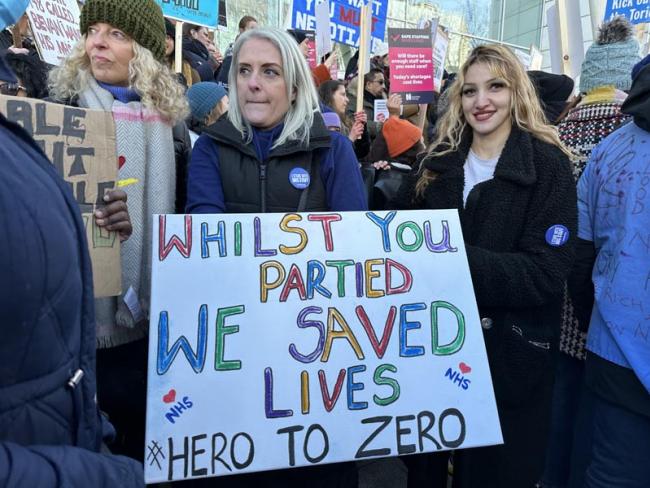
Nurses picketing University College Hospital, London, in January 2023 during their pay dispute. Photo Workers.
No parliament holds the answers to what workers in Britain need. Electing a different government and hoping things will get better is an illusion – one that comes around every time the Labour Party is in opposition.
The only way workers get progress out of parliament is when they take action and elected politicians follow. But it’s becoming ever harder to take such action (see Assert the right to strike).
The first Labour government took office a century ago.Yet Labour governments have been reluctant to repeal a single clause of any anti-trade union law. The working class smashed the Industrial Relations Act in the 1970s. But since then successive governments of all parties have passed ever more anti-trade union laws.
Sunak’s failing government must call an election this year. And then we’ll endure blanket coverage from the media, as if the outcome mattered. Meanwhile Britain’s industry and utilities, energy, transport, water, even football clubs, are increasingly foreign-owned.
Both political parties support aggression and war abroad. With the return of Cameron, and Blair lurking behind Starmer, there will be no change unless parliament is forced to look at Britain first.
We took a great step towards independence in 2016. Now the urgent task is to follow through the consequences of that decision. But no political party standing candidates in elections has anything to say on the matter.
November’s presidential election in the USA, and the ballyhoo that goes with it, is already feverishly discussed in the media. Its outcome matters not a jot to British workers. Yet we have imported some of the worst features of American political life: the growing politicisation of the civil service and the influence of religiously affiliated lobbies.
In Scotland, a Westminster election could be an opportunity to clear out the discredited and incompetent separatists of the Scottish National Party at Westminster and bury for good their agitation for another “independence” referendum.
Whatever the fate of the SNP at the polls, the Labour Party itself proposes “federalism”. That is as much an attack on Britain’s national unity as is outright secession (see Devolution - a serious threat across Britain).
Labour supports more devolution, not less, Even though it’s unwanted, it wants to impose devolution on English regions, increasing the number of city mayors and their powers. And it wants more areas devolved to the Welsh and Scottish parliaments, including increased taxation powers.
There is too much to do to squander our class energy in electoral diversions. Workers have power when they organise and take action. Let’s get started with demands setting out what we need.
